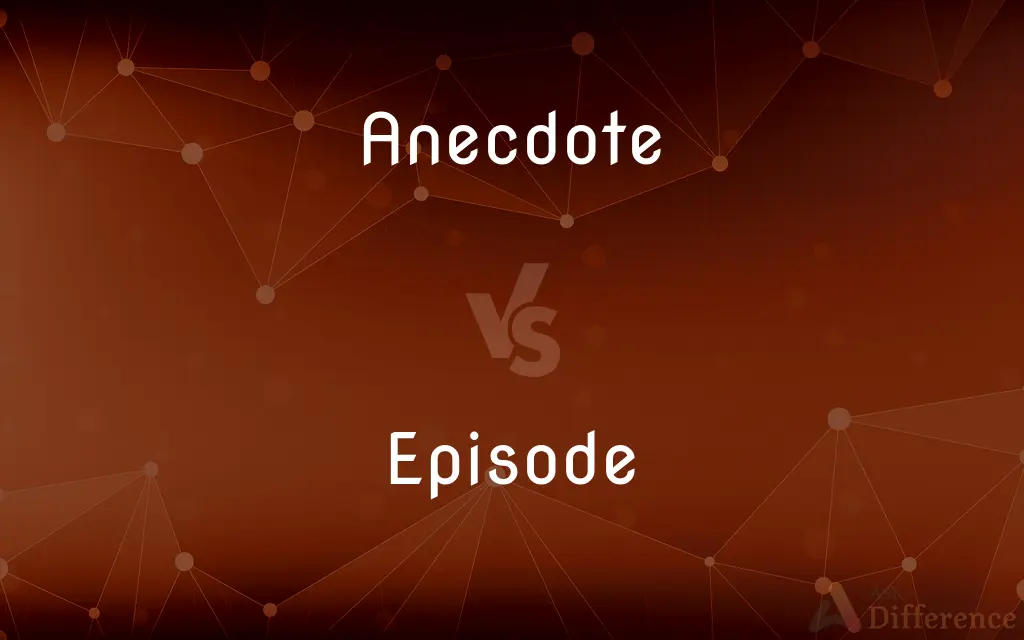Anecdote vs. Episode — What's the Difference?
By Urooj Arif & Maham Liaqat — Updated on April 15, 2024
An anecdote is a short, amusing or interesting story about a real incident, while an episode refers to an event or a series of events within a larger sequence in a narrative or series.

Difference Between Anecdote and Episode
Table of Contents
ADVERTISEMENT
Key Differences
An anecdote is typically a brief and engaging story used to illustrate a point or entertain, often based on personal experience or historical events. Whereas, an episode is a component of a sequence, such as a television series or a person's life, and is often more structured and less standalone than an anecdote.
Anecdotes are frequently personal and shared in informal settings to evoke laughter or empathy, often relying on the storyteller's perspective and creativity. On the other hand, episodes can be fictional or nonfictional and are usually part of a larger plot, unfolding in a more defined and chronological order.
In literature and daily conversations, anecdotes serve to make abstract ideas concrete and memorable, enriching the narrative with personal touches. In contrast, episodes are used to advance the overall storyline in novels, TV shows, and other serialized formats, contributing to character development and thematic depth.
Anecdotes often encapsulate moral or philosophical points, making them popular in speeches and educational settings. Whereas episodes, especially in media like television, focus on maintaining viewer engagement across multiple segments or seasons, often ending with cliffhangers to build anticipation.
The nature of anecdotes allows them to stand alone without the need for context or continuation, making them effective in diverse communicative scenarios. Episodes, however, depend on their relationship to other episodes for full impact, emphasizing continuity and evolution of the narrative.
ADVERTISEMENT
Comparison Chart
Definition
A short, often amusing story about a real incident
A part of a sequence in a narrative
Purpose
To entertain, illustrate a point, or evoke empathy
To advance the main plot or theme
Context
Personal, historical, often standalone
Part of a larger story or series
Usage
Informal speeches, writing, casual conversations
Serialized stories, TV shows, novels
Dependency
Can stand alone
Relies on sequence and context for impact
Compare with Definitions
Anecdote
A small, memorable tale often told during conversations.
His anecdote about the mischievous dog was hilarious.
Episode
A segment of a television or radio series.
The final episode of the series airs tonight.
Anecdote
A personal account which may illustrate a point.
Her anecdotes about the trip made us want to go there, too.
Episode
One part of a serialized narrative in literature or drama.
Each episode of the novel introduces new characters.
Anecdote
A short and often humorous story about a real incident or person.
He shared an anecdote about his first day at school.
Episode
An incident or a series of events in a person’s life.
That vacation was an unfortunate episode in an otherwise great summer.
Anecdote
An engaging story from someone's past experiences.
Grandpa's anecdotes are always the highlight of our gatherings.
Episode
A distinct part of a larger story that unfolds over time.
The episode revealed important details about the protagonist’s background.
Anecdote
A brief narrative used to make larger points clear.
The speaker used an anecdote to explain the complex concept.
Episode
A section of a continuous sequence in any narrative.
The latest episode in their ongoing dispute happened yesterday.
Anecdote
An anecdote is a brief, revealing account of an individual person or an incident: "a story with a point," such as to communicate an abstract idea about a person, place, or thing through the concrete details of a short narrative or to characterize by delineating a specific quirk or trait. Occasionally humorous, anecdotes differ from jokes because their primary purpose is not simply to provoke laughter but to reveal a truth more general than the brief tale itself.Anecdotes may be real or fictional; the anecdotal digression is a common feature of literary works and even oral anecdotes typically involve subtle exaggeration and dramatic shape designed to entertain the listener.
Episode
An episode is a narrative unit within a larger dramatic work or documentary production, such as a series intended for radio, television or on-line consumption. Episode derives from the Greek term (Ancient Greek: ἐπεισόδιον / epeisodion), meaning the material contained between two songs or odes in a Greek tragedy.
Anecdote
A short amusing or interesting story about a real incident or person
He told anecdotes about his job
Episode
A separate part of a serialized work, such as a novel or television series.
Anecdote
A short account of an interesting or humorous incident.
Episode
A section of a classic Greek tragedy that occurs between two choric songs.
Anecdote
Pl. an·ec·dotes or an·ec·do·ta (-dōtə) Secret or hitherto undivulged particulars of history or biography.
Episode
An incident or event that is part of a progression or a larger sequence
"one brief, if distressing, episode in a life rich in adventures, challenges, sorrows and joys" (Elizabeth Speller).
Anecdote
A short account of a real incident or person, often humorous or interesting.
Tell an anecdote
Relate a short anecdote
Episode
One of a series of events in the course of a narrative or drama.
Anecdote
An account which supports an argument, but which is not supported by scientific or statistical analysis.
Episode
(Music) A passage between statements of a main subject or theme, as in a rondo or fugue.
Anecdote
A previously untold secret account of an incident.
Episode
An incident, action, or time period standing out by itself, but more or less connected with a complete series of events.
It was a most embarrassing episode in my life.
Anecdote
(ambitransitive) To tell anecdotes (about).
Episode
An instalment of a drama told in parts, as in a TV series.
I can't wait till next week’s episode.
Anecdote
Unpublished narratives.
Episode
A separate incident, story, or action, introduced for the purpose of giving a greater variety to the events related; an incidental narrative, or digression, separable from the main subject, but naturally arising from it.
Anecdote
A particular or detached incident or fact of an interesting nature; a biographical incident or fragment; a single passage of private life.
Episode
A happening that is distinctive in a series of related events
Anecdote
Short account of an incident (especially a biographical one)
Episode
A brief section of a literary or dramatic work that forms part of a connected series
Episode
A part of a broadcast serial
Episode
Film consisting of a succession of related shots that develop a given subject in a movie
Common Curiosities
What is an episode?
An episode refers to a distinct part of a story or sequence of events, often used in the context of television series or serialized narratives.
How do anecdotes differ from episodes in usage?
Anecdotes are mainly used in informal settings to entertain or make a point, while episodes are structured parts of larger narratives in media or literature.
What is an anecdote?
An anecdote is a short, often humorous or interesting story about a real event or person, typically personal and used to illustrate a point.
Can an anecdote be part of an episode?
Yes, anecdotes can be used within episodes of shows or books to add depth or illustrate characters' personalities.
Are anecdotes always true?
Anecdotes are based on real events, but they often include personal embellishments or subjective interpretations.
How important are episodes to the overall story in a series?
Episodes are crucial as each one progresses the overarching plot or develops characters further.
Can episodes stand alone?
While some episodes, like those in anthology series, can stand alone, most are part of a continuous narrative.
How do episodes contribute to character development?
Episodes allow for detailed explorations of character traits and evolutions over time.
Why are episodes important in television?
Episodes build the narrative arc, engage viewers, and often end with elements that encourage continued watching.
What makes a good anecdote?
A good anecdote is engaging, relatable, and often includes a humorous or insightful twist.
How do anecdotes enhance public speaking?
Anecdotes make speeches more engaging and relatable, helping to clarify and emphasize the speaker's points.
Can an episode be nonfictional?
Yes, episodes in documentaries or nonfiction series relate true events and stories.
Do anecdotes need to be detailed?
Anecdotes are effective when brief and focused, with enough detail to entertain and make the point clear.
Are anecdotes used in professional settings?
Yes, anecdotes are often used in professional settings to illustrate points, share experiences, and connect with audiences.
What is the difference between an episode and a chapter?
An episode is a part of a serialized visual or auditory medium, whereas a chapter is a division in a book.
Share Your Discovery

Previous Comparison
Carrier vs. Shipper
Next Comparison
Overconfident vs. ArrogantAuthor Spotlight
Written by
Urooj ArifUrooj is a skilled content writer at Ask Difference, known for her exceptional ability to simplify complex topics into engaging and informative content. With a passion for research and a flair for clear, concise writing, she consistently delivers articles that resonate with our diverse audience.
Co-written by
Maham Liaqat















































